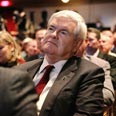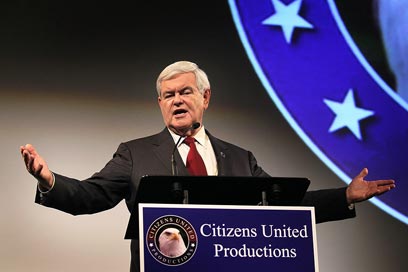
Newt Gingrich
צילום: AFP
Palestinian textbooks debate reaches US campaign
Researchers say Republican presidential hopeful Newt Gingrich's remarks on how Palestinian textbooks 'teach terrorism' largely unfounded
Do Palestinian school textbooks "teach terrorism," as Newt Gingrich claimed in a recent debate among US Republican presidential hopefuls?
His example, that Palestinians "have text books that say, 'If there are 13 Jews and nine Jews are killed, how many Jews are left?'" is not in any of the texts, researchers said.
Related stories:
- Gingrich: Palestinians an 'invented' people PA fails to meet UNESCO's education standards Op-ed: Promoting hate for Israel
As for Gingrich's broader claim, the textbooks do not directly encourage anti-Israeli violence, but they also don't really teach peace, studies say.
A review of some texts by AP, as well as several studies by Israeli, Palestinian and international researchers, found no direct calls for violence against Israel.

Confused? Gingrich (Photo: AFP)
The books do, however, lack material about the historic Jewish presence in the region and scarcely mention Israel and then mostly in a negative way. Peace with Israel rarely comes up. Texts for religious schools are harder-core, openly glorifying martyrdom.
Researchers disagree sharply in their interpretation of the material.
Two NGOs, one Israeli and one international, support the view of Israeli officials that the texts promote hatred of Israel. For example, Israel is not included in a list of the countries of the Levant, and Hebrew writing was removed in a depiction of a stamp from British Mandate rule of the Holy Land.
A joint Israeli-Palestinian study takes a softer view, saying that there is no direct attempt to delegitimize Israel, but that "the way and contexts in which Israel is presented may give rise to the impression of an implicit denial of its legitimacy."
The books must be seen in the context of ongoing conflict, said Nathan Brown, a George Washington University political scientist who has written about the issue. While highly nationalistic, government texts do not glorify violence, explicitly deny Israel's right to exist or portray Jews as villains, he said.
"I think the textbook critics have cause and effect mixed up – when there is a viable political process it may be possible to introduce a process to revise the books in a reciprocal way," Brown said.
Skewed views
The argument looms large in a debate driven by the Israeli government, which frequently accuses the Palestinians of incitement in their schools.
"How can you take someone seriously as a partner in peace, if instead of teaching their children reconciliation they teach hate," said Israeli government spokesman Mark Regev. "It's the heart of the matter."
The Palestinians say their books legitimately focus on their national narrative, including hardships of life under occupation. "We might have a problem with Zionism, but this is not incitement, this is a difference in views," said Ghassan Khatib, spokesman of the Palestinian Authority, which controls part of the West Bank.
Khatib further defended the omission of Israel from Palestinian textbooks: "When Israel is going to include us in their textbooks, we will include them in our textbooks," he said. "It is supposed to be a mutual thing."
The question has suddenly become an issue in the US presidential campaign and Brown, as well as researches Itamar Marcus from Palestinian Media Watch and Eldad Pardo from IMPACT-SE, said the example Gingrich cited does not exist in the texts.
Texts taught in secular Israeli schools continue to promote the Jews' right of return, but more space than in the past is now allocated to the Palestinians and their pain, said Ruth Firer, of Hebrew University.
Since it took control of parts of the West Bank and Gaza Strip in 1994, the PA has been working to replace the Egyptian and Jordanian books used in its schools for decades previous.
Under intensive scrutiny from Israel and the international community, the Palestinians developed their own curriculum and purged their new textbooks of some controversial references, but kept the focus on the Palestinian narrative.
Palestinian Media Watch and IMPACT-SE harshly criticized the Palestinian textbooks: "There is a lot of jihad, martyrdom, a complete ignoring of anything Israeli," said Pardo, a Hebrew University of Jerusalem professor and member of IMPACT-SE. "There is no education for peace, there is education for conflict."
Shelley Elkayam of IMPACT-SE said the religious school students are influential since they go on to be religious teachers and preachers.
The textbooks include statements glorifying martyrdom. One 8th-grade text says Muslim fighters must "get rid of the usurping Jews from the usurped lands in Palestine and in the Levant."
The Palestinian Education Ministry only began supervising the Islamic schools in 2010 and is gradually replacing the old texts with new ones "based on moderation," said Mohammed Jihad, head of the religious school system.
"Although there is no direct instruction for immediate violence against Israelis ... hate, rejection and a vision of one Greater Islamic-Arab Palestine are fostered," said the study, which was released in May and reviewed 70 government textbooks and 25 religious school texts. "An imaginary geography in which Israel does not exist is being taught."
- Receive Ynetnews updates directly to your desktop










